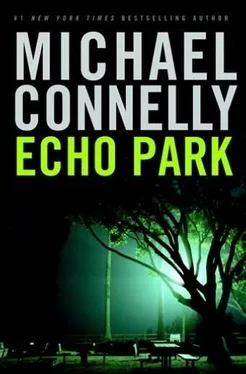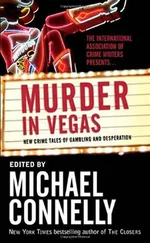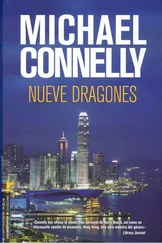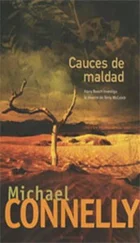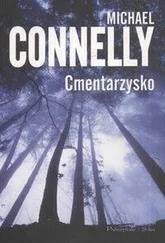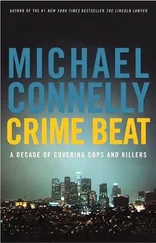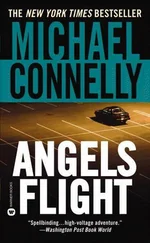“Fuck the coin, Harry,” Pratt said angrily. “You can replace it for ten bucks. Stay away from the investigation. Go home and stay home until you hear from me. Am I clear?”
“You’re clear.”
“Besides, what the fuck? If you lost your coin out there the Forensics people would have found it already. They went over that scene with a metal detector looking for cartridges.”
Bosch nodded.
“Yeah, I sort of forgot about that.”
“Yeah, Harry, you forgot? Are you bullshitting with me?”
“No, Top, I’m not. I forgot. I was bored and decided to come look for it. I saw Randolph’s people and decided to keep my head down. I just didn’t think they’d call in my plate.”
“Well, they did. And then I got the call. I don’t like blowback like this, Harry. You know that.”
“I’m going home right now.”
“Good. Stay there.”
Pratt didn’t wait for Bosch’s response. He clicked off and Bosch closed his phone. He flipped the heavy coin into the air, caught it in his palm, badge side up, and pocketed it. He then walked to his car.
SOMETHING ABOUT BEING TOLD to go home made Bosch not go home. After leaving Beachwood Canyon he made a stop at St. Joe’s to check in on Kiz Rider. She had changed locations again. She was now out of ICU and on a regular patient floor. She didn’t have a private room but the other bed in the room was empty. They often did that for cops.
Speaking was still difficult for her and the malaise of depression she exhibited that morning had not lifted. Bosch didn’t stay long. He passed on a get-well from Jerry Edgar and then left, finally going home as instructed and hauling in the two cartons and files he had collected earlier from the Open-Unsolved Unit.
He put the cartons on the floor in the dining room and spread the files out on the table. There was a lot and he knew he could probably occupy himself for at least a couple days with what he had taken from the office. He went over to the stereo and turned it on. He knew that he already had the Coltrane-Monk collaboration from Carnegie Hall in the machine. The player was on shuffle and the first song out was called “Evidence.” Bosch took that as a good sign as he went back to the table.
To begin he had to take an inventory of exactly what he had so he could decide how to approach his review of the material. First and foremost was the copy of the investigative record in the current case Raynard Waits was being prosecuted for. This had been turned over by Olivas but not studied closely by Bosch and Rider because their assignments and priorities were the Fitzpatrick and Gesto cases. On the table Bosch also had the Fitzpatrick murder book Rider had pulled out of Archives as well as his secret copy of the Gesto murder book, of which he had already completed a review.
Finally, on the floor were the two plastic cartons containing whatever pawn records had been salvaged after Fitzpatrick’s business was torched and then soaked by fire hoses during the 1992 riots.
There was a small drawer in the side of the dining room table. Bosch figured that it had been designed for silverware but since he used the table more often to work on than to eat on, the drawer contained an assortment of pens and legal pads. He withdrew one of each, deciding that he needed to write down the important aspects of the current investigation. After twenty minutes and three torn-off and crumpled pages, his free-form thoughts had filled less than half a page.
/ arrest
Echo Park
\ escape (Red Line)
Who is Waits? Where is the castle? (destination: Echo Park)
Beachwood Canyon-setup, false confession
Who benefits? Why now?
Bosch studied the notes for a few moments. He knew that the last two questions he had written were actually the starting point. If things had gone according to plan, who would have benefited from Waits’s false confession? Waits, for one, by avoiding a death sentence. But the real winner was the real killer. The case would have been closed, all investigations halted. The real killer would escape justice.
Bosch looked at the two questions again. Who benefits? Why now? He considered them carefully and then reversed their order and considered them again. He came to a single conclusion. His continued investigations of the Marie Gesto case had created a need for something to be done now. He had to believe that he had knocked too hard on someone’s door and that the entire Beachwood Canyon plan had come about because of pressure he was continuing to exert on the case.
This conclusion led to the answer to the other question at the bottom of the sheet. Who benefits? Bosch wrote:
Anthony Garland-Hancock Park
For thirteen years Bosch’s instinct had told him Garland was the one. But beyond his instincts there was no evidence directly connecting Garland to the murder. Bosch had not yet been made privy to the evidence, if any, that was developed during the excavation of the body and the autopsy, but he doubted that after thirteen years there would be anything usable-no DNA or forensics that could tie the killer to the body.
Garland was a suspect under the “replacement victim” theory. That is, his rage toward the woman who had dropped him led him to kill a woman who reminded him of her. The shrinks would call it a long-shot theory but Bosch now moved it front and center. Do the math, he thought. Garland was the son of Thomas Rex Garland, wealthy oil baron from Hancock Park. O’Shea was in a highly contested election battle, and money was the gasoline that kept a campaign engine running. It was not inconceivable that a quiet approach had been made to T. Rex, a deal struck and a plan enacted. O’Shea gets the money he needs to win the election, Olivas gets the head investigator nod in O’Shea’s office and Waits takes the fall for Gesto while Garland takes a ride on it.
It was said that L.A. was a sunny place for shady people. Bosch knew that better than most. He had no hesitation in believing Olivas had been part of such a scheme. And the thought of O’Shea, a career prosecutor, selling his soul for a shot at the top slot didn’t give him pause for very long either.
“Run, you coward! How’s your bullshit deal looking now?”
He opened his phone and called Keisha Russell at the Times. After several rings he checked his watch and saw it was a few minutes after five. He realized she was probably on deadline and ignoring her calls. He left a message at the prompt, asking her to call back.
Since it was so late in the day Bosch decided he had earned a beer. He went to the kitchen and got an Anchor Steam out of the box. He was happy he had gone high end the last time he bought beer. He took the bottle out on the deck and watched as the heart of rush hour gripped the freeway below. The traffic slowed to a crawl and the incessant sound of car horns of every variety began. It was just far enough away to be less than intrusive. Bosch was glad he was not down there in the fight.
His phone buzzed and he pulled it out of his pocket. It was Keisha Russell calling back.
“Sorry, I was going over tomorrow’s story with the copyeditor.”
“I hope you spelled my name right.”
“Actually, you’re not in this one, Harry. Surprise.”
“Glad to hear it.”
“What can you do for me?”
“Uh, I was actually going to ask you to do something for me.”
“Of course you were. What could it be?”
“You’re a political reporter now, right? Does that mean you look at campaign contributions?”
“I do. I review every filing by every one of my candidates. Why?”
He walked back inside and muted the stereo.
Читать дальше
